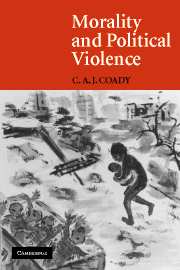Book contents
- Frontmatter
- Contents
- Preface
- Morality and Political Violence
- 1 Staring at Armageddon
- 2 The Idea of Violence
- 3 Violence and Justice
- 4 Aggression, Defence, and Just Cause
- 5 Justice with Prudence
- 6 The Right Way to Fight
- 7 The Problem of Collateral Damage
- 8 The Morality of Terrorism
- 9 The Immunities of Combatants
- 10 Morality and the Mercenary Warrior
- 11 Objecting Morally
- 12 Weapons of Mass Destruction
- 13 The Ideal of Peace
- 14 The Issue of Stringency
- Bibliography
- Index
14 - The Issue of Stringency
Published online by Cambridge University Press: 05 June 2012
- Frontmatter
- Contents
- Preface
- Morality and Political Violence
- 1 Staring at Armageddon
- 2 The Idea of Violence
- 3 Violence and Justice
- 4 Aggression, Defence, and Just Cause
- 5 Justice with Prudence
- 6 The Right Way to Fight
- 7 The Problem of Collateral Damage
- 8 The Morality of Terrorism
- 9 The Immunities of Combatants
- 10 Morality and the Mercenary Warrior
- 11 Objecting Morally
- 12 Weapons of Mass Destruction
- 13 The Ideal of Peace
- 14 The Issue of Stringency
- Bibliography
- Index
Summary
The art of our necessities is strange,
That can make vile things precious.
Shakespeare, King LearThe requirements, prohibitions, and permissions of just war theory that have been discussed throughout this book may be interpreted in more or less stringent ways. To some extent, this mirrors what happens in morality more generally, for there are degrees of importance and even of force that attach to different forms of moral judgement. An obvious one is the difference between strict obligation and the pull of supererogation: between, that is, what we must do or avoid doing and what it would be admirable or even saintly, but not strictly binding, to do. Others have distinguished what is morally obligatory from what would merely be morally decent. Then again, the distinction between obligations and ideals is sometimes elucidated (at least in part) in terms of a difference in stringency of requirement. These contrasts raise many problems and need more discussion than they will receive here, but what intuitive plausibility they have can serve to introduce a pressing issue about the force of the prohibitions of just war theory, especially those of the JIB.
All of these prohibitions and requirements, of course, are subject to the necessity for interpretation in concrete circumstances, as we saw clearly in the discussion of proportionality and the debates about the grey areas of noncombatant status.
- Type
- Chapter
- Information
- Morality and Political Violence , pp. 283 - 300Publisher: Cambridge University PressPrint publication year: 2007



